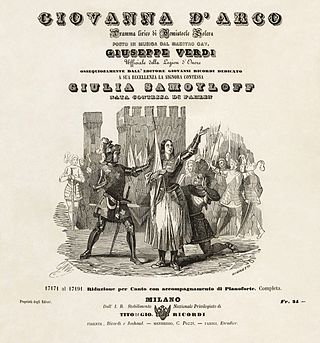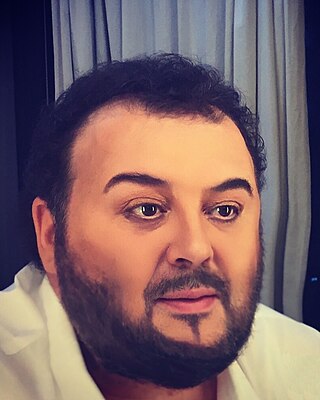Related Research Articles

Giuseppe Fortunino Francesco Verdi was an Italian composer best known for his operas. He was born near Busseto to a provincial family of moderate means, receiving a musical education with the help of a local patron, Antonio Barezzi. Verdi came to dominate the Italian opera scene after the era of Gioachino Rossini, Vincenzo Bellini, and Gaetano Donizetti, whose works significantly influenced him.

Un ballo in maschera is an 1859 opera in three acts by Giuseppe Verdi. The text, by Antonio Somma, was based on Eugène Scribe's libretto for Daniel Auber's 1833 five act opera, Gustave III, ou Le bal masqué.

The Messa da Requiem is a musical setting of the Catholic funeral mass (Requiem) for four soloists, double choir and orchestra by Giuseppe Verdi. It was composed in memory of Alessandro Manzoni, whom Verdi admired, and therefore also referred to as the Manzoni Requiem. The first performance, at the San Marco church in Milan on 22 May 1874, conducted by the composer, marked the first anniversary of Manzoni's death. It was followed three days later by the same performers at La Scala. Verdi conducted his work at major venues in Europe.

Luisa Miller is an opera in three acts by Giuseppe Verdi to an Italian libretto by Salvadore Cammarano, based on the play Kabale und Liebe by the German dramatist Friedrich von Schiller.

Giovanna d'Arco is an operatic dramma lirico with a prologue and three acts by Giuseppe Verdi set to an Italian libretto by Temistocle Solera, who had prepared the libretti for Nabucco and I Lombardi. It is Verdi's seventh opera.

The Messa per Rossini is a Requiem Mass composed to commemorate the first anniversary of Gioachino Rossini's death. It was a collaboration among 13 Italian composers, initiated by Giuseppe Verdi. The composition was intended to be performed on 13 November 1869 in the Basilica of San Petronio, Bologna, where Rossini grew up and spent a large part of his life.

Alzira is an opera in a prologue and two acts by Giuseppe Verdi to an Italian libretto by Salvatore Cammarano, based on the 1736 play Alzire, ou les Américains by Voltaire.

Michèle Crider is an American lirico spinto operatic soprano. She has appeared in many of the great opera house in the world including the Royal Opera House Covent Garden, the Metropolitan Opera in New York, San Francisco Opera, Los Angeles Opera and the state operas of Vienna, Munich, Berlin and Hamburg. She has sung under Riccardo Muti, Daniel Barenboim, Zubin Mehta, James Levine, Nello Santi, Christoph von Dohnányi, Semyon Bychkov, Seiji Ozawa, Riccardo Chailly and Colin Davis. She is professor of vocal performance at the Mozarteum University Salzburg.

Gianluigi Gelmetti OMRI, was an Italian-Monégasque conductor and composer.

Giuseppe Patanè was an Italian opera conductor.

Ruggero Raimondi is an Italian bass-baritone opera singer who has also appeared in motion pictures.

Herva Nelli was an Italian and American operatic soprano.

Ramón Vargas is a Mexican operatic tenor. Since his debut in the early '90s, he has developed to become one of the most acclaimed tenors of the 21st century. Known for his most expressive and agile lyric tenor voice, he is especially successful in the bel canto repertoire.

Violeta Urmanavičiūtė-Urmana is a Lithuanian opera singer who has sung leading mezzo-soprano and soprano roles in the opera houses of Europe and North America.
Taro Ichihara is a Japanese opera singer, who sings as a tenor, primarily in Verdi roles.

Alexandru Agache is a Romanian operatic baritone who has had an active international career since 1979. Possessing a powerful and flexible voice, he has drawn particular acclaim in the operas of Giuseppe Verdi.
In opera, a banda refers to a musical ensemble which is used in addition to the main orchestra and plays the music which is actually heard by the characters in the opera. A banda sul palco was prominently used in Rossini's Neapolitan operas. Verdi used the term banda to refer to a banda sul palco, as in the score for Rigoletto. He used the term banda interna, to refer to a band which is still separate from the orchestra but heard from the off-stage wings. The early scores of La traviata use a banda interna.
Loïc Guguen was a contemporary French dramatic baritone.

Fabio Sartori is an Italian operatic tenor. He is particularly known for his interpretations of Italian roles by Giuseppe Verdi, Giacomo Puccini and of the Verismo.

The Messa da requiem in D minor (1835) is a musical setting of the Catholic funeral mass (Requiem) by Italian opera composer Gaetano Donizetti. It is scored for five soloists, mixed chorus and orchestra. A performance lasts about 62–75 minutes.
References
- ↑ Rosen, David in Sadie, Stanley, ed. (1992). The New Grove Dictionary of Opera . Oxford: Oxford University Press. ISBN 978-0-19-522186-2., vol. 4, p.42.
- ↑ Messa da Requiem for the Anniversary of the Death of Manzoni, 22 May 1874, by Giuseppe Verdi, University of Chicago Press
- ↑ Verdi: Requiem, Cambridge University Press (Cambridge Music Handbooks)
- ↑ Budden, Julian (1981). The Operas of Verdi, Volume 3. London: Cassell. ISBN 0-304-30740-8., p. 25.
- ↑ Un Ballo in Maschera di Giuseppe Verdi, Ricordi